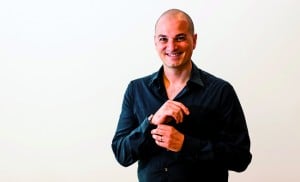The audience has changed forever – and so must we, contends Yousef Tuqan Tuqan.
Everything has changed.
To know just how much things have changed, let’s go back in time. Not too far back, just to my 18th birthday in Amman, Jordan in 1993. I lived on a planet where I had access to two TV channels, one English radio station, and one English-language newspaper.
Now imagine trying to explain to 18-year-old me the planet we live on today. A planet where every person is walking around (and usually ignoring each other) with a piece of glass and metal in the palm of their hand that weighs less than 200 grams.
Through this piece of glass, you can access every film ever made, every book ever written, every piece of music ever performed, and every news article ever published, anytime you want to. And most of it is available for free.
Not only that, you can see and hear every other person in the world anytime you want to. You can buy almost anything you want, or you can order your food. You can see every inch of the Earth, and every star in the sky. You can seek out your future husband, or apply for a job, through this piece of glass.
It seems that this little piece of glass has changed everything in the way these people live on this planet.
An 18-year-old today – who sits in the heart of Generation Y – the next generation of consumers born in the 1980s and 1990s, lives on a different planet, and he is no longer our future. He is our present.
More than half of the GCC’s population is under 25.
- This is the same generation that has 87,000 possible combinations of drinks available at Starbucks.
- This is the same generation that expects the level of personalisation and service that Amazon offers in every aspect of their lives.
- These people believe the answer to any question or need, whether personal, professional, commercial, or social, can be found through the endless digital content available to them. If the solution isn’t there, they’ll invent it (witness Uber or Airbnb).
- This is the same generation that accesses Facebook 14 times a day on average, expecting a completely personalised experience. With the choice to opt out of ever seeing a brand’s advertising again.
To speak to 18-year-old me, all you had to do to capture my attention was show me the best thing available on two channels. To speak to this generation, you don’t need to offer them the best thing available across two channels, or one thousand channels, or one million websites. You need to offer them the best thing they have ever seen
Sounds pretty daunting, doesn’t? You see, everything has changed.
And yet…
Nothing has changed.
The word “advertising” comes from the Latin “ad vertere” which means “to turn toward”. Capturing someone’s attention – to “turn them towards” our message – has been the guiding principle of our industry for the last 150 years. And at the heart of this pursuit has been storytelling.
Throughout human history, storytelling has existed at the heart of our civilisation. Stories are how we educate, entertain and enlighten each other, and the best stories can endure forever – passing through generations and across millennia. Storytelling works because it allows the listener to create rational and emotional connections between cause and effect, and to internalise lessons in the most impactful way.
While the structure of the stories we tell has stayed remarkably the same throughout the ages, the way in which we tell stories never stops changing. Though some may seem quaint now, every evolution in media and technology has taken hold largely through its ability to tell stories effectively for a new audience. From the Roman amphitheater to the printing press, from colour television to the internet, every shift in communication has ushered in better methods of storytelling.
In this new world of unlimited content, channels and interactivity, the story has changed. As the amount of noise – marketing messages, endlessly available content – increases, convincing our audience to “turn towards” us has never been harder.
However, in today’s world of endless information and noise, our audience is more susceptible to great stories than ever before, because stories create meaning, and meaning creates impact. The best brands are the ones who tell the best stories. And most importantly, they have to be authentic, because brands and their audiences live in the real world, and their stories have to endure.
Storytelling – the core of what we do as communicators – has not changed. If anything, our craft has never been more important.
But in order to be effective in the future, advertisers must master both the ‘story’ and the ‘telling’.
In this new world, stories will be told on a variety of platforms and levels, with different entry points for our audience. We no longer control the process through which stories are engaged, and we cannot control the ways they are expanded upon by an audience. All we can do is create the best stories we can, and hope that they are powerful enough to resonate with our audience, and good enough that they will share them and bring them to life.
What is important to remember is that every advancement in the storytelling medium came with an inherent period of exploration, experimentation, trial and error and eventual mastery of these mediums. We are no different today, and we need to be brave enough to try new things, to capture moment and reflect the spirit of our times.
I have worked in the MENA advertising industry for my entire career – since 1996 – and I have always been a passionate advocate for the role of digital in the marketing mix. And for the last eighteen years, I have watched as analog methods of media consumption shifted to digital, and then as they shifted from digital to social and mobile.
And every year, I am asked the same question: will this be the year that digital will replace analog? Is this finally the year that online will replace offline? It’s a valid question, and one that I finally have the answer to. The revolution has quietly taken place, and the answer is clear. We now are speaking to audience that consumes their media through mobiles first, and everything they do is socially-powered. End of story.
However, even though consumers exist in a social and mobile world, they still live in an offline world. Consumers do not differentiate between ‘online’ and ‘offline’, and neither can advertisers.
Just consider the three biggest winners in the Cyber category this summer at Cannes. Volvo Trucks’ ‘Epic Split’, Chipotle’s ‘Scarecrow’ and ‘24 Hours Of Happy’ were all beautiful films with almost no ‘cyber’ elements to them. However, because they were designed for a social and mobile audience, those brands could invest more on crafting beautiful stories than on the media buying they would have traditionally needed to capture their attention.
They existed in an online world – and drove sales of trucks, sandwiches and music in an offline world.
Despite whatever platform, gadget or app the future may throw at us, we must also remember that the world is still comprised of human beings who look to stories (and to each other) as a way of making emotional connections with a sense of empathy and understanding.
And I for one could not be more excited about the opportunities we have ahead of us.
We find ourselves today sitting on the most golden opportunity any generation of marketers could dream of:
- We are an industry that is driven by innovation, technology and creativity, and every new invention enables us to tell better stories.
- We are speaking to the most empowered, connected and enlightened generation in human history.
- We must fight harder then ever to capture their attention by being more targeted, more relevant and more entertaining that ever before.
However, in order to remain relevant to this audience to build brands that endure into the future, we must remember that although our internet speeds and our mobile phones and our televisions might change, we as people do not.
If we want to be relevant, we need to take advantage of all of these shifts in technology and media to tell better stories, and to build brands and relationships that tap into the most basic of human emotions, because we provide the most basic of human needs as communicators.
The need to be entertained. The need to be inspired. The need to feel part of a community. And the need to connect.
So everything has changed. And nothing has changed.
However, we know that our audience has changed forever. And so must we.
(Yousef Tuqan Tuqan is chief innovation officer at Leo Burnett/Publicis Group MENA)










